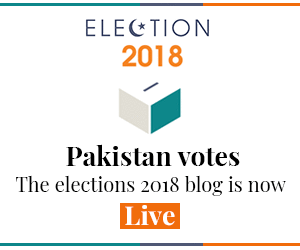
THE caretaker government’s expression of resolve to ensure the holding of free and fair elections can only be welcomed and one hopes the requisites of a genuine and democratic election are not being taken for granted.
The need for elections to be democratic is generally not fully appreciated. Elections are sometimes claimed to be free and fair even under totalitarian regimes. In the subcontinent, elections held on a limited suffrage were claimed to be free and fair by alien rulers and elections held in Pakistan under separate electorates also were supposed to be free and fair. Further, in a country where feudal and patriarchal aberrations hold sway and discrimination on grounds of belief and social status is widespread, the obstacles to democratically free and fair elections are almost insurmountable.
These constraints lie largely outside the caretaker regime’s jurisdiction but its duty to limit the adverse effects of the socioeconomic, faith-related and gender-based barriers to free voting cannot be gainsaid. The Election Commission of Pakistan (ECP) has a clear mandate to proceed against anyone who calls upon voters to follow its religious edicts or prevents women from voting, but it will need the administration’s firm backing to be able to protect the genuineness of elections.
These traditional problems apart, the government and the ECP both should be aware of the special challenges the coming general election poses. Political polarisation in the country, particularly in Punjab, is at its peak, and large-scale attempts to influence the poll outcome cannot be ruled out. One of the most efficient means to deal with such situations is to have as large contingents of election observers as feasible.
The government and the ECP both have benefited a great deal from foreign election observers that have been watching Pakistan’s general elections since 1988. The first foreign observers who came in 1988 were eminent politicians, jurists, academics and media representatives from South Asian countries. Such missions also came in 1990 and 1993 and their reports were warmly appreciated by the ECP.
The National Democratic Institute of the US also has been observing Pakistan elections since 1988. The European Union, too, has been sending groups of senior parliamentarians and election experts to observe elections here, and quite a few of their valuable recommendations have been accepted.
These foreign observers have followed a broad mandate. Instead of merely observing the casting of ballots, they have carried out intensive studies on Pakistan’s Constitution, laws and electoral processes. Acting on the observers’ recommendations, the European Union and some of its members have rendered considerable support to the ECP.
The ECP would be well advised to invite as many observers from credible organisations as possible.
The ECP would be well advised in its own interest and that of democracy to invite and entertain as many observers from credible organisations as possible. Instead of leaving matters in the hands of the overburdened ECP, the government should assume a proactive role and invite the EU and other friendly countries to send large teams of election observers.
At the same time, the ECP should adopt a liberal policy towards the domestic observers who have built a strong reputation as election monitors. The positive role the observers, domestic as well as foreign, can play cannot be exaggerated, They can help the government deal with pre-poll and post-poll rigging and irregularities and their presence at polling stations on the polling day will facilitate orderly balloting.
The authorities must also ensure that the election process conforms to the standards laid down in United Nations instruments. As a member of the UN Human Rights Council, Pakistan has special responsibilities in this regard and it should also keep in mind the need to avoid criticism from the international bodies, especially during Universal Periodic Reviews.
The government and the ECP are fully aware of international human rights standards but with a view to increasing public awareness these criteria may be briefly recalled here.
The entire structure of peoples’ rights and states’ obligations to their citizens is based on two cardinal assumptions: firstly, that all communities are entitled to be free from bondage to any alien authority, and, secondly, that all people have a right to be governed by their freely chosen representatives. Hence we find these principles enunciated in the Universal Declaration of Human Rights, which upholds everyone’s right to take part in the government of his country, and the people’s right to be governed by their representatives, chosen freely in periodic and genuine elections by universal and equal suffrage and secret vote.
The declaration’s non-enforceable provisions have been given the form of treaty obligations vide Article 25 of the International Covenant on Civil and Political Rights, duly ratified by Pakistan. It says: “Every citizen shall have the right and the opportunity…
“(a) To take part in the conduct of public affairs, directly or through freely chosen representatives;
“(b) To vote and be elected at genuine, periodic elections which shall be by universal and equal suffrage and shall be held by secret ballot, guaranteeing the free expression of the will of the electors.”
Similar provisions can be found in the International Convention on the Elimination of all Forms of Racial Discrimination (Article 5-C), the Convention on the Elimination of All Forms of Discrimination against Women (Article 7) and the Convention on the Political Rights of Women (Articles I,II,III), all of these formally ratified by Pakistan.
While Pakistan’s Constitution and laws do recognise the state’s obligation to respect international human rights standards regarding elections it has to try to escape censure by the UN bodies on the ground that while it grants its citizens the right to vote and be elected it doesn’t offer them equal opportunity, and that a large number of women and members of religious minorities cannot exercise their electoral rights.
Pakistan cannot afford a controversial election; the consequences at home and abroad could be disastrous.
Published in Dawn, June 14th, 2018











































